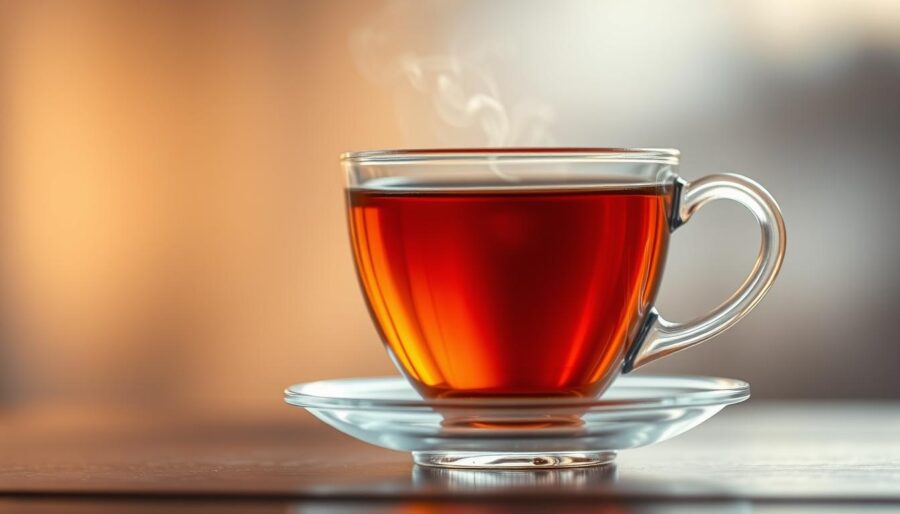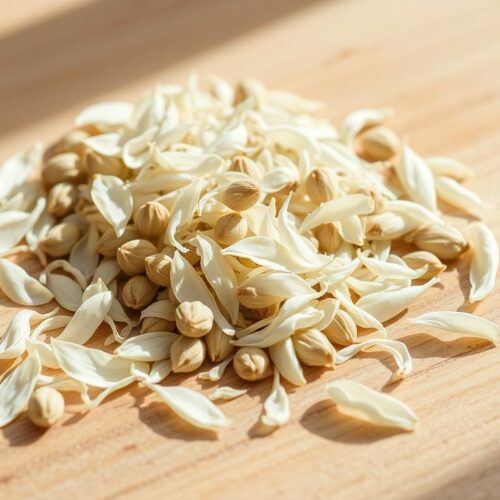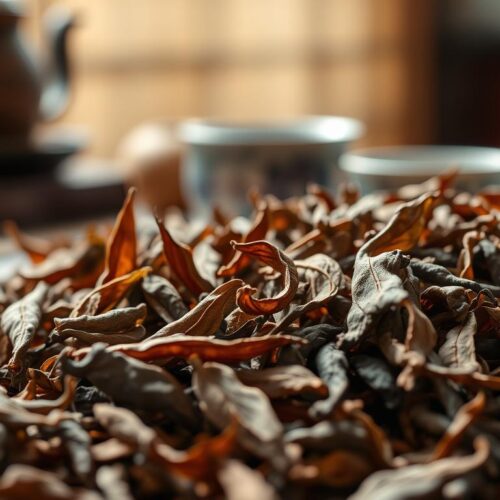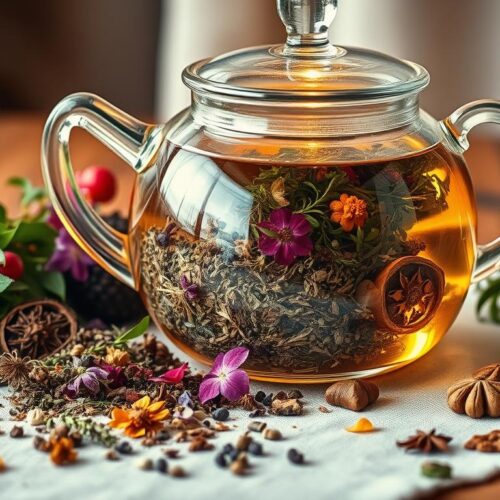As tea with caffeine becomes more popular, it’s important to know the caffeine levels in different teas. Every kind of tea has its own unique taste and amount of caffeine. This can greatly affect how you enjoy your tea.
With tea’s rising popularity in the US, understanding the caffeine in tea is key. We will look into how caffeine in tea can change its flavor and health perks. This guide aims to show you the diverse world of tea. That way, you can make the most out of each sip.
Understanding Caffeine in Tea
Caffeine is a natural stimulant found in tea leaves among other plants. It blocks adenosine receptors in your brain when you drink tea. This makes you feel more awake and full of energy. The way caffeine affects you can differ based on how much you can tolerate and the tea type.
Studies show that caffeine, when taken in moderation, has benefits. It can make you more alert and lift your mood. Tea gives a smooth energy boost because it has caffeine, amino acids, and antioxidants. This mix is different from other caffeinated drinks.
Knowing how caffeine works helps you choose your tea wisely. Keep in mind how caffeine might make you jittery or affect your sleep. This awareness helps you pick a tea that suits your needs best.
Types of Tea and Their Caffeine Content
It’s important to know how much caffeine is in different teas. Each kind has its own caffeine level. Black tea has about 50mg per 8-ounce cup. This makes it a preferred choice for lots of people. Oolong tea also has about 50mg of caffeine, giving a strong flavor and energy boost.
Green tea has 30 to 50mg of caffeine, depending on how it’s made. White tea has less caffeine, about 20mg per cup, because it’s lightly processed. So, if you want to cut down on caffeine but still enjoy tea, white tea might be perfect for you.
The way you make your tea can change how much caffeine it has. Different teas need different brewing times and water temperatures. Matcha, for example, can have up to 100mg of caffeine. It’s mixed into hot water in a special way, which gives you more caffeine than regular tea.
| Tea Type | Caffeine Content (mg per 8 oz) | Brewing Time | Water Temperature (°F) |
|---|---|---|---|
| Black Tea | 50 | 3-5 minutes | 200-212 |
| Oolong Tea | 50 | 4-7 minutes | 190-200 |
| Green Tea | 30-50 | 2-3 minutes | 160-185 |
| White Tea | 20 | 4-5 minutes | 160-185 |
| Matcha | up to 100 | 1-2 minutes | 175 |
Factors Influencing Caffeine Levels in Tea
Caffeine in tea changes due to many factors. The type of tea leaves plays a big role in caffeine content. For example, younger tea leaves have more caffeine than older ones. Thus, choosing different leaves changes the caffeine amount a lot.
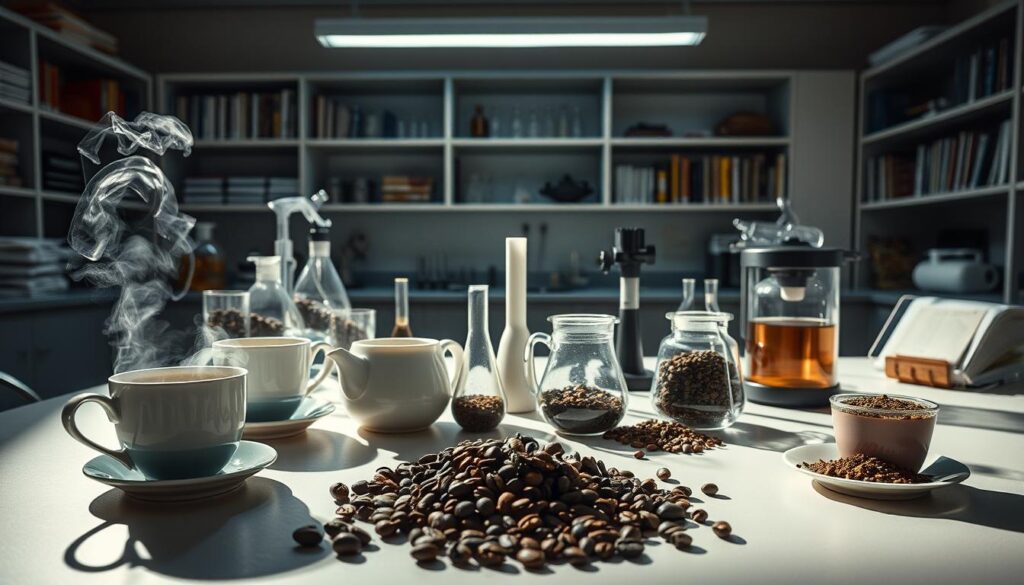
How tea is picked affects its caffeine too. Picking the youngest leaves by hand gives the tea a richer flavor and more caffeine. And, how the tea is processed, like fermentation, can change caffeine levels. It can make the caffeine higher or lower.
The way tea plants are grown also matters for caffeine. If plants grow in the shade, they end up with more caffeine. This is because they’re not fighting for sunlight.
How you brew the tea is key for caffeine. The water’s temperature and how long you steep the tea affect caffeine levels. Hot water and longer steeping pull out more caffeine. So, tweaking these can help you get the caffeine level you want in each cup.
Comparing Tea to Coffee
When thinking about caffeine, you might wonder about coffee versus tea. Generally, coffee packs more caffeine than most teas. An 8-ounce coffee has about 90 to 200 milligrams of caffeine.
In contrast, the same amount of tea, like matcha, tops at 100 milligrams. This difference leads to varying effects on our bodies. Coffee can give a quick energy boost, helpful when you need to wake up fast. This fast jolt is often followed by feeling more alert.
Tea, on the other hand, gives a milder lift. Its caffeine spreads out slowly, giving energy that lasts longer. This means you can enjoy a boost without the jittery feeling you get from coffee.
Whether you prefer tea or coffee often depends on how your body handles caffeine and what effect you’re after. If you need immediate energy, coffee might be best for you. But if you want a steady boost with fewer jitters, go for tea.
Popular Tea Brands and Their Caffeine Levels
Getting to know the caffeine in different teas helps you choose better. Brands have different blends, which change the caffeine amount.
Lipton’s black tea has about 55 mg of caffeine in each 8-ounce cup. Their green tea, however, has around 30 mg. Twinings, a famous brand, has English Breakfast tea with 40 mg. Their Earl Grey has up to 47 mg.
Stash offers many flavors. For example, their Chai tea has about 60 mg of caffeine. Check product packaging for exact numbers because blend, flavor, and brewing time can change caffeine levels.
Looking at these brands helps you find teas that fit your caffeine needs. Knowing this makes your tea time more enjoyable.
How to Choose Your Tea Based on Caffeine
Picking your tea based on caffeine needs is crucial. It’s key to match your tea choice with what you do daily and how much caffeine you can handle. There are many types of tea with different caffeine levels to fit your life.
If you need a big caffeine boost, go for black tea. Green tea is great for a softer boost. For those sensitive to caffeine or wanting to unwind, herbal teas are perfect because they have no caffeine and help you relax.
- Your desired energy level during the day.
- Specific situations like work or chilling out.
- How caffeine affects you.
- When you like to drink your tea.
Choosing your tea this way means it will not only taste great but also fit your needs and lifestyle well.
| Type of Tea | Caffeine Content (mg per 8 oz) | Ideal Use |
|---|---|---|
| Black Tea | 40-70 | Morning boost or afternoon pick-me-up |
| Green Tea | 20-45 | Gentle energy for mid-day |
| Oolong Tea | 30-50 | Balanced option for leisure |
| White Tea | 15-30 | Subtle energy, perfect for relaxation |
| Herbal Tea | 0 | Nighttime or for calming effects |
Knowing how to select tea based on its caffeine can improve how much you enjoy it and its benefits throughout your day.
The Health Benefits of Tea Consumption
Exploring the health benefits of tea can make a big difference in your life. Many studies have shown that drinking tea regularly helps lower the chance of getting sick. This is because teas are full of antioxidants. These antioxidants keep your body safe from harm caused by stress and harmful particles.
Adding different teas to what you eat can bring many good changes. For example, green tea is packed with catechins, strong antioxidants. Black tea has unique flavonoids that keep your heart healthy. Herbal teas can make you feel relaxed and clear your mind, thanks to elements like L-theanine.
The link between tea and heart health is strong. Studies show that people who drink tea often have fewer heart problems. The reason is that tea can make blood vessels work better and reduce bad cholesterol.
Below is a table summarizing the health benefits of different types of tea:
| Type of Tea | Key Antioxidants | Health Benefits |
|---|---|---|
| Green Tea | Catechins | Boosts metabolism, supports skin health |
| Black Tea | Flavonoids | Promotes heart health, aids digestion |
| Oolong Tea | Mental alertness-promoting compounds | Enhances brain function, benefits weight management |
| Herbal Tea | Varies by herb | Calming effects, may reduce anxiety |
Trying different teas can be a fun way to enjoy their health benefits while discovering new flavors. By taking advantage of these benefits, you can give your lifestyle a healthy boost.
Understanding Decaffeinated Tea
Decaffeinated tea is a great choice for those wanting less caffeine but still loving tea’s rich flavors and health benefits. It’s made by taking out most caffeine from the tea leaves. The goal is to keep the tea’s original taste and benefits.
There are different ways to remove caffeine, like the carbon dioxide method or the water process. Each method tries to keep the tea’s natural taste. Even after caffeine is removed, these teas may have 2-5 mg of caffeine per cup. This small amount makes decaffeinated tea perfect for those wanting less caffeine without quitting tea.
Looking for a good decaffeinated tea? You might find brands like Twinings and Celestial Seasonings offer many caffeine-free choices. These options let you explore different tea flavors, from herbal to black, without caffeine’s side effects. Decaffeinated tea is a fantastic choice for any time of the day, adding variety to your daily drink habits.
Enjoying Tea Responsibly
Drinking tea responsibly is key to keeping healthy. Tea has many benefits, but too much caffeine can cause issues like restlessness or trouble sleeping. Knowing how much caffeine works for you is important.
To make sure your tea drinking is mindful of caffeine:
- Begin with a mild tea like green tea, which has less caffeine.
- Choose herbal teas later in the day to avoid too much caffeine.
- Monitor how many cups you drink, to stay within your caffeine comfort zone.
- Drink water or caffeine-free drinks as well to remain hydrated.
It’s important to balance tea drinking with staying hydrated. Having tea responsibly, along with smart eating, can improve your daily energy. Always pay attention to your body and change your tea routines if needed.
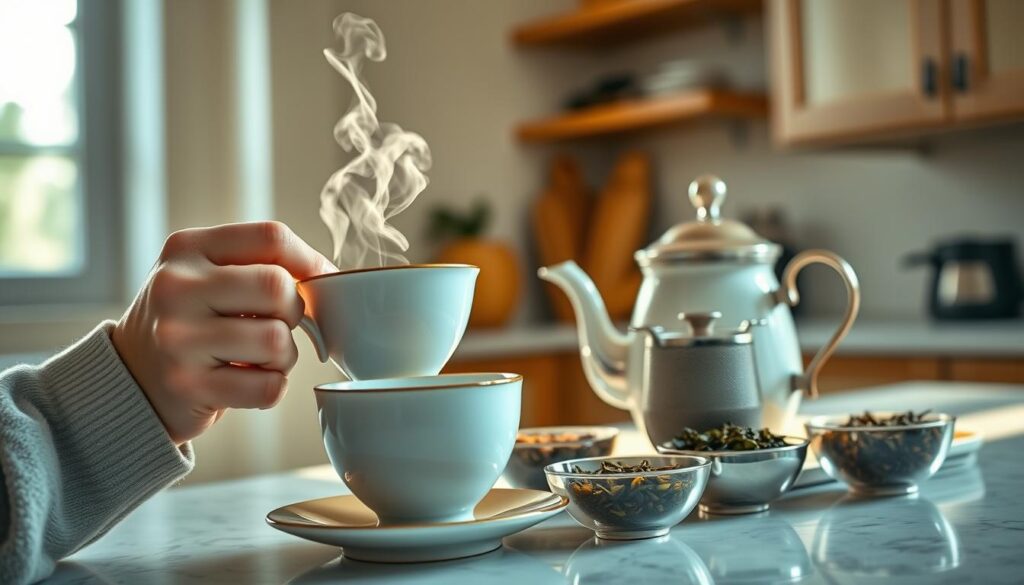
Caffeine Myths and Facts
There’s a lot of wrong info out there, especially about tea and caffeine. Many think all teas have way less caffeine than coffee. But some teas, like black tea, can almost match a coffee’s caffeine. Knowing the real tea facts can change how you think about your caffeine intake.
Many believe that herbal teas have no caffeine at all. But that’s not always true. For example, yerba mate and guayusa have a good amount of caffeine. Knowing the truth helps you choose teas that match what you want caffeine-wise and health-wise.
Understanding these caffeine myths can make your tea time better. It lets you separate what’s true from what’s not. With the right info, you can really enjoy tea’s benefits and taste, without letting myths mislead you.
Conclusion: Finding Your Perfect Cup of Tea
Knowing how much caffeine is in tea helps you make the best choice for your needs. You’ve learned about different teas and how things like processing affect caffeine levels. This lets you pick a tea that tastes great and has the right amount of caffeine for you.
Try different teas to find your favorite. You might like a strong black tea or a light white one. There’s a tea out there for everyone’s taste and energy needs.
Tea can add joy to your day. Keep in mind the caffeine it has to stay healthy. So, grab a cup, kick back, and enjoy finding your perfect tea.

